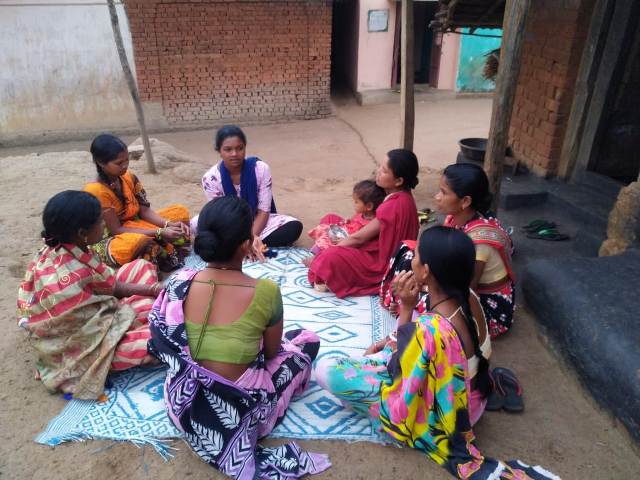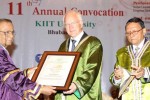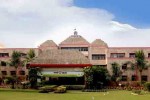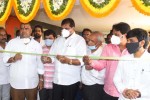By Chandrika Patnaik
Community Champions through the facilitation and resource centres for migrant workers is helping prospective migrants and their families to make informed choices about opportunities, services and entitlements. The Safe and Dignified Migration programme benefits 1800 migration dependent households in the Thuamul Rampur block of Kalahandi and Kerala corridor.

Last year, a few days after India went into a lockdown on 24 March 2020, Padmanabha Naik managed to return from Kerala to his village, Adri, in Odisha’s Kalahandi district. He was happy to get back to the village as Padmanabha and his friends struggled during the initial days of the sudden lockdown without the regular supply of food and salary.
Padmanabha’s joy faded quickly as he soon exhausted his savings taking care of his family. He found little work in the village to keep the income going. When Ramesh Chhatria from Gram Vikas met him during a village meeting, he was desperate, “There is no work available here. My children need food. I have a family to support. Without work, how will we survive?”
Ramesh is a part of the Community Champions Network of the ‘Safe and Dignified Migration of the Rural Poor’ programme supported by Arghyam, across three villages Adri, Gopalpur, and Balisara, in Kalahandi. The program will help 1800 migrant workers and their families to make informed migration decisions, build skills, provide information and decision support systems. It will ensure timely access to entitlements and social security schemes in the Thuamul Rampur block of the district.
While Gram Vikas provides the necessary support at the source sites, the Centre for Migration and Inclusive Development ensures that their needs are taken care of at the destination sites in Kerala.
The programme will help migrants find jobs. The Community Champions map their skills, note their previous work experience, areas of interest, salary expectations, and then match them with the requirements of the prospective employers. They then register the migrant workers for the bus trip from Kalahandi to Kerala for a fee of ₹3500 per person. Each of the migrant workers gets insured for ₹1 lakh at no extra cost to pay in the eventuality of a case of death, disability, or accident at the destination location.
The 26-year-old Ramesh remembers the ready uptake of the service from the migrant workers, “I first met Padmanabha during a meeting in Adri in December 2020. He was keen to go back to Kerala. He was one of the first migrants who registered with us at the ShramikBandhuSeva Kendra (SBSK) in Adri and was part of the first bus trip that left Kalahandi for Kerala in January 2020.”
The Shramik Bandhu Seva Kendra (SBSK) in Odisha and the Bandhu Shramik Seva Kendra (BSSK) in Kerala are facilitation and resource centres for migrant workers. The BSSK will provide the necessary support to migrant workers in Kerala, such as financial literacy, translation, transportation, accommodation, and psycho-social counseling.
Pramita Majhi, another Community Champion in village Gopalpur, talks about how the programme provides more than just jobs, “Before they leave, we brief them about our helpline. We make sure that they have the number to call if there is an incident at work or for any information when they are at their work location.”
Ramesh is enthusiastic about his job as he shares the feedback from migrant workers on the service, “In the past week, I have received calls from Padmanabha and Bijay Majhi, who left by bus earlier this year in January and February. Bijay now works in Kerala and is from Tentulipada village in Kalahandi. Both of them work as car cleaners at different places in the Ernakulam district in Kerala. They both called to express their happiness and thank Gram Vikas for helping them get work in their preferred field with good accommodation and provision for food.”
Migrant workers usually travel to Kerala with very little information about opportunities, services, or entitlements, which leaves them vulnerable to exploitation. A particular pain point is the lack of access to formal financial services or inadequate financial literacy, which can help the migrant workers and their families benefit much more from the incomes earned.
Gram Vikas collaborated with ESAF Small Finance Bank in Kerala to undertake financial literacy campaigns in the source villages. Purna Chandra Majhi is an SBSK Community Champion in Adri village. He used to be a migrant worker in Kerala two years ago.
Purna underwent the financial literacy training in April 2020 and says that he understands its value, “Being a migrant myself, I can understand the problems faced by migrants who land in Kerala without a job and necessary information. As a Community Champion, I am helping the workers and families make informed decisions through constant engagement. We hold meetings and campaigns in their villages so that before leaving for Kerala, the migrant worker and his family receive the necessary knowledge and financial skills to manage the remittance income through formal savings in banks.”
The champions also promote entrepreneurship like setting up grocery shops, buying a motor pump for crop cultivation during the dry months, etc., for livelihood opportunities in their home villages.
Balasing Majhi’s son, Arjun, works in Kerala as a migrant worker. He talks about what he learned from the village meetings with the champions, “During the meeting, they explained ways for us to manage better the income from the remittances. Earlier, we were not aware of financial services available, nor did we know enough about savings in banks. They also explained the benefits of linking our Aadhar cards to our savings bank accounts. This is like waking up to new possibilities.”
(The story was first published in the official website of Gram Vikas)

















